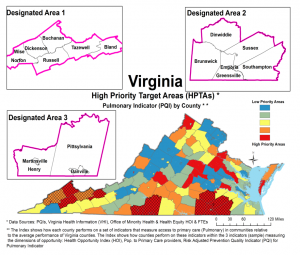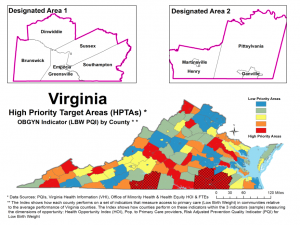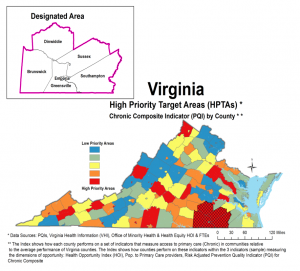The Virginia Health Opportunity Index (HOI) is a resource that could be used in a variety of ways. This blog post describes how we use it with the Conrad-30 program to bring qualified physicians to some of the most underserved areas of Virginia.
The Conrad-30 ProgramThe Conrad-30 Waiver Program is a great resource that brings high-quality foreign physicians to the Commonwealth. International Medical Graduates (IMGs) may complete their graduate medical or residency training in the United States using a J-1 Visa, which lets them remain in the United States during their studies.* However, after finishing school, they must return to their home country for two years before they may return to the U.S. Conrad-30 waives this requirement for a limited number of IMGs who agree to serve underserved populations. Conrad-30, named for the number of open slots per state, prioritizes primary care physicians (PCP), with most of the slots dedicated to PCPs working in Federally-designated shortage areas. Within those 30, each state is allotted 10 “flex slots” that gives flexibility in the specialty and work areas. Virginia allocates five discretionary slots to specific high priority specialties and work areas.
Identifying Target Areas
Virginia’s Conrad-30 Waiver Program is administered by the Virginia Department of Health – Office of Minority Health and Health Equity (VDH-OMHHE) health workforce division, led by Health Workforce Specialist, Olivette Burroughs. Olivette consults with stakeholders, including Virginia’s Primary Care Association (PCA), to identify specialties and areas of need.Stakeholder consultations are essential for this program, but it is equally important to have data to support discretionary selections. Working with Olivette, VDH-OMHHE’s data unit identified three data sources to guide the placement of discretionary Conrad-30 physicians:
- Avoidable Hospital Stays (reported by Virginia Health Information): These are stays that could be avoided with high-quality medical care outside of the hospital, usually primary care. While not always avoidable, rates of these stays should decrease when quality health care is available and accessible within a community. Avoidable hospital stays are cataloged by condition, including composite groups such as lung conditions or chronic disease composites.
- The Virginia Health Opportunity Index (HOI) 1.0: The first version of the Virginia HOI was released in 2010. Like its successor, it offered a broad examination of the opportunity Virginians have to live a long and healthy life, based on where they live.
- Physician Full-Time Equivalency Units (FTEs): VDH-OMHHE’s data unit maintains an up-to-date database on physicians and other health professionals using data collected from the Virginia Department of Health Professions. The database includes specialty, work hours and other data.
These three sources identify vulnerable populations that could benefit from increased access to physicians. Since avoidable hospital stays are available at the county level, we aggregated Census Tract level estimates for the Virginia HOI and physician FTEs to the county level. Areas that scored lowest among these three sources and were identified as high need areas by Virginia’s PCA were selected for discretionary slots.
The Target Areas
Ultimately, three areas were identified as high priority for Pulmonologists, two for Obstetrician/Gynecologists and one for Primary Care. With the exception of one area in Southwest Virginia identified for Pulmonologists, all other identified areas were in Southside Virginia. While there is broad need for physician services across Virginia, these areas stood out based on their high rates of avoidable hospitalizations.Emporia and its surrounding counties, was a target area identified as high priority for all three specialists, while the Martinsville/Danville area was identified as a high priority target area for pulmonogists and OBGYNs. You can explore how these areas fare in the current version of the Health Opportunity Index using our county dashboards.
Pulmonologists:

Obstetrician/Gynecologists:
 Primary Care:
Primary Care:

The Results
Olivette is accepting applications for its Conrad-30 discretionary slots through August, 2016. Physicians who fill these positions in Virginia know that they will serve vulnerable populations with a demonstrated need for their services. If you are an interested physician (or know of an interested physician) please contact Olivette Burroughs (olivette.burroughs@vdh.virginia.gov).The Conrad-30 program demonstrates how the Virginia HOI, when used in conjunction with other data sources and stakeholder input, could help programs and policymakers target resources. Utilizing the Virginia HOI helps the Conrad-30 program ensure Virginians who face added barriers to better health based on where they live are considered in the analysis for physician placement. This sets a fair and adequate baseline of access to care for all regions of Virginia, and contributes to ongoing efforts to make Virginia the healthiest state in the nation.* International Medical Graduates are defined as individuals who are not U.S. citizens but are accepted to pursue graduate medical training or residency in the United States. They may use a J-1 Visa or a H-1B1 Visa.

